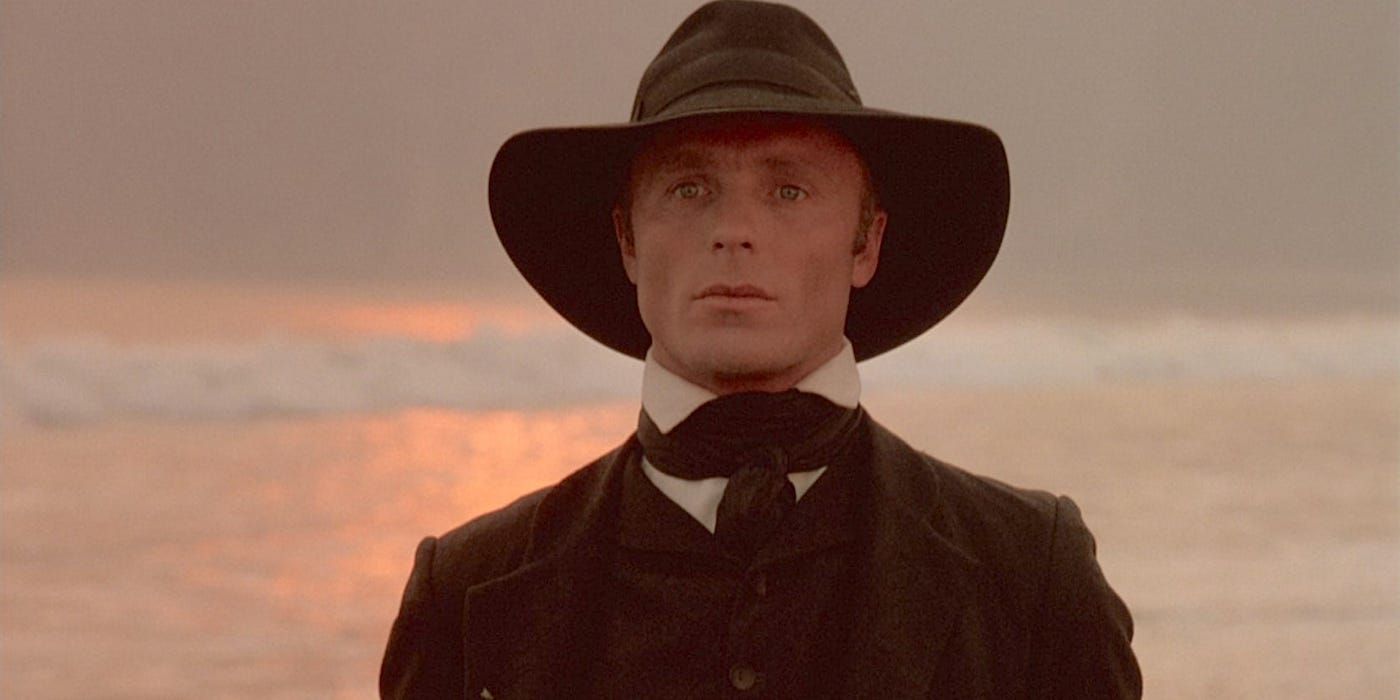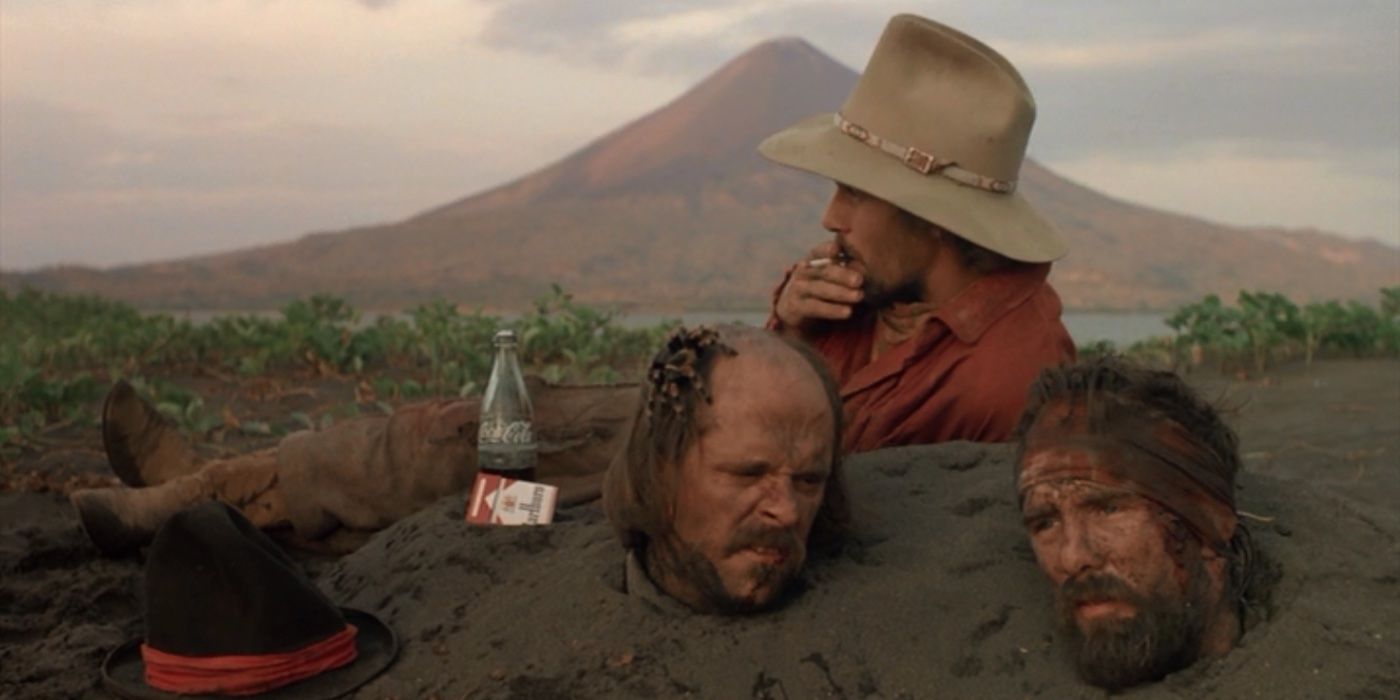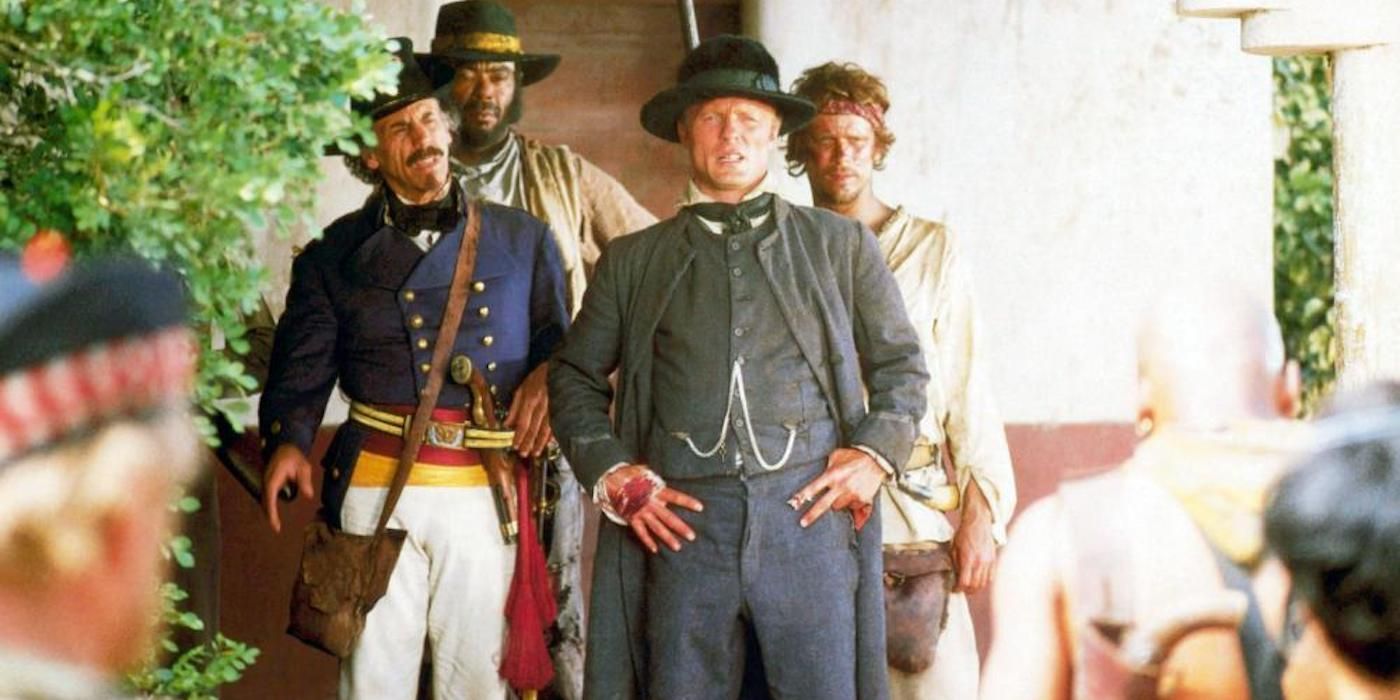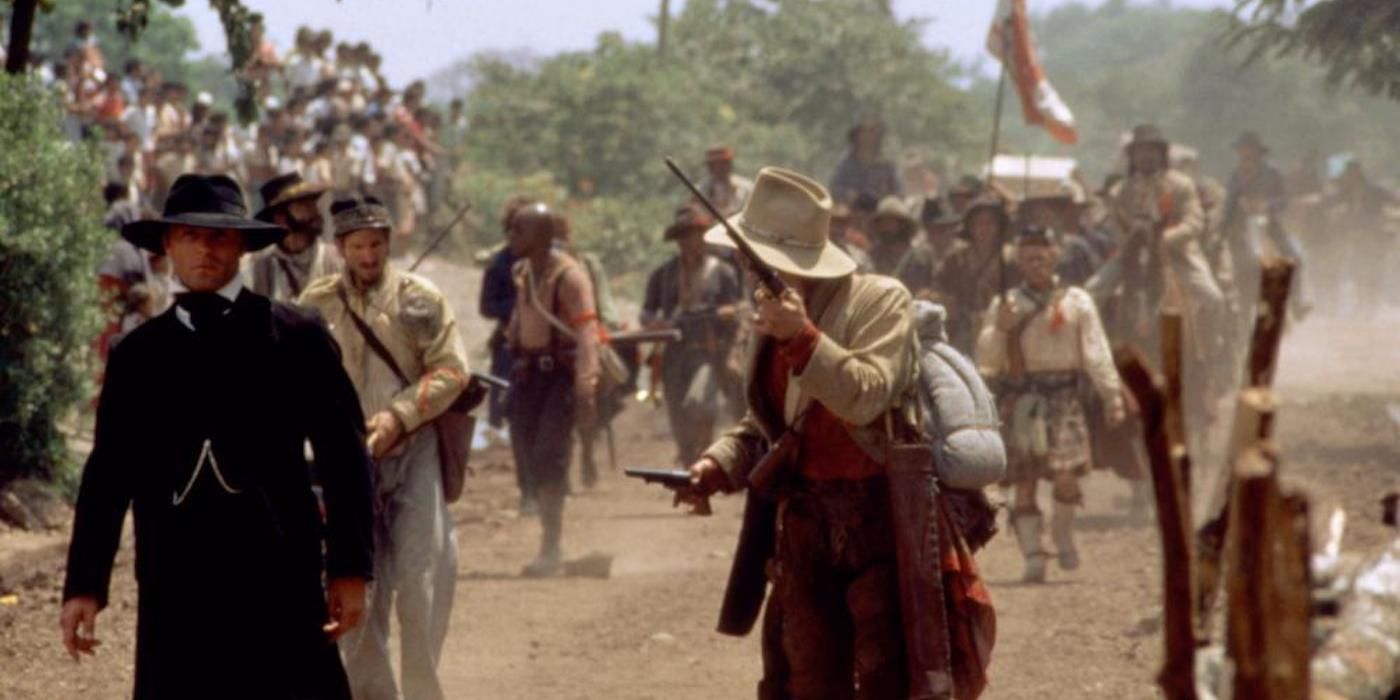Through a lens smeared with blood, Alex Cox’s genre-defying historical film, Walker, follows the footsteps of one of American history’s many problematic figures: the mercenary, filibuster, and self-imposed Nicaraguan president, William Walker (Ed Harris). Having already invented an anarchic, punk-rock ethos with films like Repo Men and Sid & Nancy, Cox sketches a vicious and razor-toothed portrayal of a real-life figure who is equal parts Colonel Kurtz and Darth Vader. Even if similarities can be drawn to the psychedelic madness of Alejandro Jodorowsky's El Topo and the absurd, fourth-wall-breaking comedic stylings of Mel Brooks, Cox’s movie is an entirely singular and unmatched work, an all-you-can-eat buffet of violence, brutality, and outright absurdity that uses its playful tone to skewer the very concept of imperialism.
Beyond making a damn entertaining piece of cinema, Walker sets out with the grand ambition of condemning the imperialist views followed loyally by William Walker—such as manifest destiny and the sense of superiority in the American lifestyle. At the start of the film, he loudly proclaims his unwavering belief in his right to take land, much to the chagrin of his progressive fiancée Ellen Martin (Marlee Matlin). While initially reluctant to set out on a conquering excursion of his own due to his desire to get married and start a newspaper company, Walker quickly becomes solicited by the potential spoils. Once Ellen passes away from cholera, there’s nothing stopping him from making history, and he begins a bloody imperialist campaign masquerading as saviorhood.
Walker sets its tone right out of the gate with the titular character’s failed Mexican insurrection: gunfire breaks out like staccato rhythms, bodies fly about like ragdolls, and all is bedlam—all the while, slow samba music cuts the action, slow motion shots creating a spectacle of the violence. The death and carnage themselves aren’t funny—Cox isn’t pulling tricks from the slapstick handbook—but it’s also not played for drama. It’s too ridiculous to be serious, but too rooted in reality to be the ha-ha kind of funny. Through excess and an operatic tone, Walker makes apparent the outright absurdity of the filibuster’s quest. Like the gritty Italian Spaghetti Westerns that revolutionized the genre, Walker doesn’t shy away from depicting the intensity of violence (fans of Sam Peckinpah might feel at home here, too). It’s not exactly a western (it doesn’t take place in the American West, for one), but it’s at least western-adjacent in terms of style and tone. Walker bunkers up in Nicaragua, arbitrarily domineering over the land like the corrupt authority figures in For a Fistful of Dollars or Deadwood’s Al Swearengen.
Walker himself can’t be taken seriously—and how could he be, with the humorless self-seriousness that he oozes from every recited line? Early in the film, during Walker’s domestic feud on the topic of Manifest Destiny (he believes in it, she does not), the drama is juxtaposed with the didactic soundtrack: Beethoven’s Moonlight Sonata is being played on a comically out-of-tune piano while a tone-deaf violinist accompanies. Back in the room, Walker and Ellen argue in the tone of a soapy melodrama. “You know I despise—I des-pise—slavery,” Walker shouts, with a gloriously hammy delivery from Harris. If he means it, he only kinda means it. This argument can’t be taken seriously, and neither can he. Harris, a fantastic actor, disappears into this blank-faced role with full commitment. Here's a guy practically void of human emotion that nonetheless acts larger than life.
Beyond Walker’s obviously delusional belief in manifest destiny, the motivating factor at the core of the man’s Nicaraguan insurrection is simple: capital. Cornelius Vanderbilt (Peter Boyle), a filthy-stinkin’-rich American multimillionaire who built his fortune through the water trading and railroad industries, wants to secure his rights to a shipping route connecting the Atlantic and the Pacific, and Walker’s just the guy to help. With his absolute failure of an attempt to incite a Mexican insurrection sending him back to the States with his tail between his legs, Walker’s proven himself to be a loyal parishioner in the Church of American Imperialism. Wanting to spread the ways of American democracy and capitalism across as much of the continent as possible, Walker is of a breed bold enough to set out deep into Nicaragua to aid Vanderbilt with his request.
Thus, Walker makes inseparable the concepts of imperialism and economic gain. “Do you believe in democracy, Walker? Universal suffrage?” Vanderbilt propositions him. “More than my own life,” Walker replies with an ecclesiastical solemnity. Hidden behind the curtain of the titular character’s apparent belief in improving the nation of Nicaragua is the dark truth: somebody somewhere can make a hell of a lot of money by Walker being there; taking control of the land, government, and people in order to allow material goods to be transported more easily. It's a quest that's inherently preposterous in its nature, but William Walker accepts the task as if the fate of the world were at stake.
When Walker begins his stay in Nicaragua with a set of ground rules (“No excessive drinking, no seduction, no swearing in public”), the imperialists savagely head in the direction of the sheep pen. Are they men or beasts? Can their urges be controlled? Is this Nicaraguan excursion merely an opportunity to delve into utter savagery—a bitterly ironic thought given that their stated goal was to deliver the “civilized” entrée of democracy to the people. On their way to “liberate” Managua, the army encounters an Englishman sitting peacefully before an easel, content to capture the natural beauty of the country on his canvas, and he asks the men where they’re going. “We’re liberatin’ the country for democracy,” one of them proudly recites in a thick southern drawl. “How very peculiar,” the Englishman replies, “you must be Americans.” It's a zingy little joke that further cements the film's primary point.
When the army enters Managua, rebel forces open fire on Walker and his men. Many die brutal deaths, including the army’s drummer (Richard Edson), whom Walker had personally promised would remain completely safe under his command. Meanwhile, dressed in all black (an image that would be recalled decades later with Harris’s Emmy-nominated role in HBO’s Westworld), Walker walks fearlessly through the skirmish as if he is some invincible T-1000. He’s too blindly confident in his god-given right to be there to have any fear of gunfire. With the financial backing of the imperialist Vanderbilt and his God supporting his white-American quest to conquer the land, no harm can come to him. The whole thing is played off with an absurd sense of humor, with Walker talking casually to an ally as the surrounding men are turned into ribbons of flesh.
It's a short-lived reign that's destined to fail. After realizing that the economy of his Nicaragua is collapsing, Walker suggests imposing slavery upon the nation. The black members of his troupe exit in disgust. Didn’t Walker earlier plead for his wife to believe he "detested" slavery? Is he losing his mind? Or has he always been off his rocker? The film suggests the distance between the two points, in terms of imperialism, to be minimal at best. Sure, Walker’s delusions of grandeur and his affinity for murder intensify as the film progresses, but they nonetheless remain loyal to his absurd belief in manifest destiny. He's always followed a shoddy moral compass: His erratic, reckless behavior is allowed, if not reinforced, by the imperialistic beliefs with which he operates.
Adding to the multiple layers of absurdity is the inclusion of intentional anachronisms. This 1800s-set flick features appearances of such products and objects as Diet Coke (invented in 1982), Zippo lighters (1933), and a combat helicopter (1950s at the earliest), among several others. In one scene, characters read issues of Newsweek and People magazines in a blatant sort of clownish humor that makes apparent the fictitious and satirical nature of the film. As the film culminates in its blood-soaked finale, contemporary military technology accompanies the deus ex machina of the opposing troops that arrive in the nick of time to sway the plot and end Walker’s hellish reign. These bits are quite funny—like the climactic movie-set brawl of Blazing Saddles, gleefully defying logic—but they also serve the purpose of showcasing the nightmarish, absurd quality of Walker’s savage expedition.
The inclusion of anachronisms also creates a timeless modernity in Walker’s tale. That the story in question occurs in the 19th Century is only part of the story. Walker’s cynical shedding of imperialism’s patriotic veneer may be turned in the direction of history, but that’s not to say that the film intends to stay there. Shot on location in Nicaragua during the Contra War of the 80s, the film utilizes these modern props to show that imperialism has all but vanished from modern American politics. Consequently, this distinctively historical film simultaneously becomes a blistering criticism of current affairs. Sure, it's cartoonish and funny to see 19th-century mercenaries drinking Diet Coke, but it's also kind of profound. How drastically have things really changed in the hundred-plus years since Walker's reign of power?
The punk-rock ethos of Cox's film (fact: The Clash's Joe Strummer wrote and performed the movie's score) sets out to use this absurdist humor to scorn imperialism of both the past and present. Walker is also a condemnation of the way that historical films about morally-questionable characters tend to be treated. Too often are these folks’ cruelty or inhumanity overlooked in favor of their virtues...if one can even use that word. In the hands of another artist, Walker may have become a eulogy, a sanctification of the titular character, but Cox has no interest in glamorizing William Walker. In his film, Walker is a scoundrel, a maniac, an outright psychopath whose tendency towards violence is as unwarranted as it is preposterous. Historical accuracy and logic have little room here. What’s more important is that the savage nature of Walker’s vicious campaign is portrayed to the greatest extent.
After the bloody climax, once the credits roll, Walker presents the viewer with a series of daily news clips cut between the scuzzy static of a television. Reagan talks about the Contra War, helicopters thunder over Nicaragua, and bodies lay hospitalized and possibly even lifeless. It's a sobering aftermath to a largely comical film, the ugly truth behind Walker's snide visage. Cox is telling us that imperialism isn't funny—it's horrifying—but it's pretty damn absurd.





